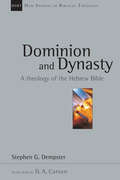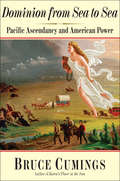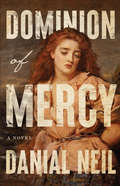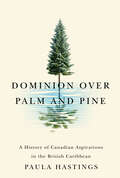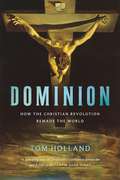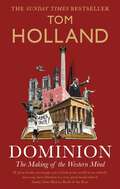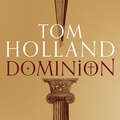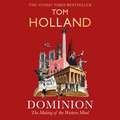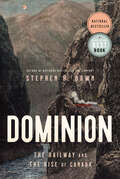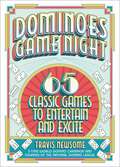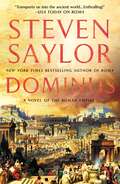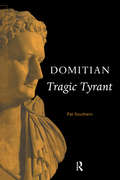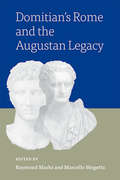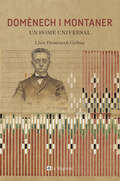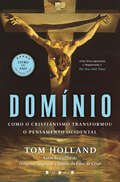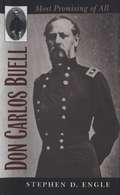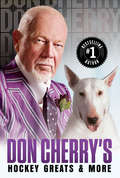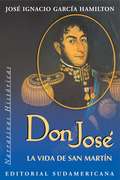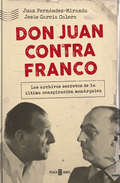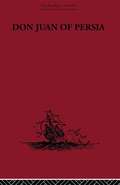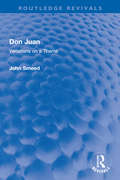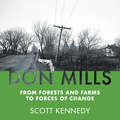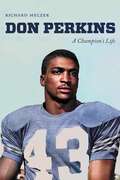- Table View
- List View
Dominion and Dynasty: A Theology of the Hebrew Bible (New Studies in Biblical Theology #Volume 15)
by Stephen G. DempsterChristian theologians rarely study the Old Testament in its final Hebrew canonical form, even though this was very likely the Bible used by Jesus and the early church. However, once read as a whole, the larger structure of the Hebrew Bible (Tanakh) provides a "wide-angle lens" through which its contents can be viewed. In this stimulating New Studies in Biblical Theology volume, Stephen G. Dempster argues that, despite its undoubted literary diversity, the Hebrew Bible possesses a remarkable structural and conceptual unity. The various genres and books are placed within a comprehensive narrative framework which provides an overarching literary and historical context. The many texts contribute to this larger text, and find their meaning and significance within its story of "dominion and dynasty," which ranges from Adam to the Son of Man, from David to the coming Davidic king. Addressing key issues in biblical theology, the works comprising New Studies in Biblical Theology are creative attempts to help Christians better understand their Bibles. The NSBT series is edited by D. A. Carson, aiming to simultaneously instruct and to edify, to interact with current scholarship and to point the way ahead.
Dominion from Sea to Sea: Pacific Ascendancy and American Power
by Bruce CumingsAmerica is the first world power to inhabit an immense land mass open at both ends to the world's two largest oceans--the Atlantic and the Pacific. This gives America a great competitive advantage often overlooked by Atlanticists, whose focus remains overwhelmingly fixed on America's relationship with Europe. Bruce Cumings challenges the Atlanticist perspective in this innovative new history, arguing that relations with Asia influenced our history greatly. Cumings chronicles how the movement westward, from the Middle West to the Pacific, has shaped America's industrial, technological, military, and global rise to power. He unites domestic and international history, international relations, and political economy to demonstrate how technological change and sharp economic growth have created a truly bicoastal national economy that has led the world for more than a century. Cumings emphasizes the importance of American encounters with Mexico, the Philippines, and the nations of East Asia. The result is a wonderfully integrative history that advances a strong argument for a dual approach to American history incorporating both Atlanticist and Pacificist perspectives.
Dominion of Capital
by Don NerbasIn the critical decades following the First World War, the Canadian political landscape was shifting in ways that significantly recast the relationship between big business and government. As public pressures changed the priorities of Canada's political parties, many of Canada's most powerful businessmen struggled to come to terms with a changing world that was less sympathetic to their ideas and interests than before. Dominion of Capital offers a new account of relations between government and business in Canada during a period of transition between the established expectations of the National Policy and the uncertain future of the twentieth century.Don Nerbas tells this fascinating story through close portraits of influential business and political figures of this period - including Howard P. Robinson, Charles Dunning, Sir Edward Beatty, R.S. McLaughlin, and C.D. Howe - that provide insight into how events in different sectors of the economy and regions of the country shaped the political outlook and strategies of the country's business elite. Drawing on business, political, social, and cultural history, Nerbas revises standard accounts of government-business relations in this period and sheds new light on the challenges facing big business in early twentieth-century Canada.
Dominion of Mercy
by Danial NeilEdinburgh, 1917: Headstrong Highland lass Mary Stewart is a vibrant woman forced into the world’s oldest profession in order to provide for her ailing father and younger sister in the city’s Old Town. When her uncle, a well-to-do solicitor with political aspirations, thinks that her presence might impede his lofty ambitions he gives her a way out with dignity: a one-way ticket to the frontier town of Anyox, British Columbia, where nurses are needed to care for injured soldiers returning from the war.Mary agrees to depart Scotland and leaves her sister in the care of her uncle, but finds that a past like hers is not easy to escape, and that living on the frontier has more challenges than even the darkest streets of Old Town. She must survive by her quick intelligence, but that is a quality that few women were allowed to reveal.Danial Neil’s historical epic Dominion of Mercy combines the gritty feel and attention to detail of HBO’s Deadwood with the Canadian sensibility of Guy Vanderhaeghe’s frontier trilogy.
Dominion over Palm and Pine: A History of Canadian Aspirations in the British Caribbean (Rethinking Canada in the World)
by Paula HastingsFrom the expansionist fervour of the late nineteenth century through both world wars and the Cold War, a varied and ever-changing group of dreamers campaigned for Canada’s union with the British Caribbean colonies. They hoped to diversify Canada’s climate and agricultural capabilities, spur economic development, boost the nation’s autonomy and stature in the Empire-Commonwealth and the world, temper American power, and secure a tourist paradise. Dominion over Palm and Pine traces the transnational ebb and flow of these union campaigns, situating them in the global history of colonialism and white supremacy, Black activism, and decolonization. Paula Hastings centres the British Caribbean in historical narratives that rarely take account of the region, challenging us to rethink the history of Canadian expansionism and its entangled relationship with nation building, the struggle for sovereignty at home and abroad, and Canada’s evolving role and reputation on the world stage. Widely conceived, the brokers of Canada’s international histories included a multiplicity of actors who shaped the evolving contours and outcomes of the debate: Canadian legislators, civil servants, businessmen, and social justice activists; Caribbean migrants, intellectuals, and anti-colonial nationalists; and British colonial officials, absentee planters, and politicians.Canada’s lack of an overseas empire is often vaunted as a national characteristic that sets Canada apart from the United States and the old European powers. In excavating the dogged resilience of Canadian designs on the Caribbean, Dominion over Palm and Pine unsettles notions of Canadian goodness that rest on this self-righteous observation.
Dominion: How the Christian Revolution Remade the World
by Tom HollandFrom the crucifixion of Jesus to the birth of modern morals, this "marvelous" account from an award-winning historian shows how the Christian Revolution forged the Western imagination (The Economist).Crucifixion, the Romans believed, was the worst fate imaginable. It was this that rendered it so suitable a punishment for slaves. How astonishing it was, then, that people should have come to believe that one particular victim of crucifixion-an obscure provincial by the name of Jesus-had been a god. Dominion explores the implications of this shocking conviction as they have reverberated throughout history.Today, the West remains utterly saturated by Christian assumptions. Our morals and ethics are not universal. Instead, they are the fruits of a very distinctive civilization. Concepts such as secularism, liberalism, science, and homosexuality are deeply rooted in a Christian seedbed. From Babylon to the Beatles, Saint Michael to #MeToo, Dominion tells the story of how Christianity transformed the world.
Dominion: The Making of the Western Mind
by Tom Holland'If great books encourage you to look at the world in an entirely new way, then Dominion is a very great book indeed . . . Written with terrific learning, enthusiasm and good humour, Holland's book is not just supremely provocative, but often very funny' Sunday Times History Book of the YearChristianity is the most enduring and influential legacy of the ancient world, and its emergence the single most transformative development in Western history. Even the increasing number in the West today who have abandoned the faith of their forebears, and dismiss all religion as pointless superstition, remain recognisably its heirs. Seen close-up, the division between a sceptic and a believer may seem unbridgeable. Widen the focus, though, and Christianity's enduring impact upon the West can be seen in the emergence of much that has traditionally been cast as its nemesis: in science, in secularism, and yes, even in atheism. That is why Dominion will place the story of how we came to be what we are, and how we think the way that we do, in the broadest historical context. Ranging in time from the Persian invasion of Greece in 480 BC to the on-going migration crisis in Europe today, and from Nebuchadnezzar to the Beatles, it will explore just what it was that made Christianity so revolutionary and disruptive; how completely it came to saturate the mind-set of Latin Christendom; and why, in a West that has become increasingly doubtful of religion's claims, so many of its instincts remain irredeemably Christian. The aim is twofold: to make the reader appreciate just how novel and uncanny were Christian teachings when they first appeared in the world; and to make ourselves, and all that we take for granted, appear similarly strange in consequence. We stand at the end-point of an extraordinary transformation in the understanding of what it is to be human: one that can only be fully appreciated by tracing the arc of its parabola over millennia.
Dominion: The Making of the Western Mind
by Tom HollandChristianity is the most enduring and influential legacy of the ancient world, and its emergence the single most transformative development in Western history. Even the increasing number in the West today who have abandoned the faith of their forebears, and dismiss all religion as pointless superstition, remain recognisably its heirs. Seen close-up, the division between a sceptic and a believer may seem unbridgeable. Widen the focus, though, and Christianity's enduring impact upon the West can be seen in the emergence of much that has traditionally been cast as its nemesis: in science, in secularism, and yes, even in atheism. That is why Dominion will place the story of how we came to be what we are, and how we think the way that we do, in the broadest historical context. Ranging in time from the Persian invasion of Greece in 480 BC to the on-going migration crisis in Europe today, and from Nebuchadnezzar to the Beatles, it will explore just what it was that made Christianity so revolutionary and disruptive; how completely it came to saturate the mind-set of Latin Christendom; and why, in a West that has become increasingly doubtful of religion's claims, so many of its instincts remain irredeemably Christian. The aim is twofold: to make the reader appreciate just how novel and uncanny were Christian teachings when they first appeared in the world; and to make ourselves, and all that we take for granted, appear similarly strange in consequence. We stand at the end-point of an extraordinary transformation in the understanding of what it is to be human: one that can only be fully appreciated by tracing the arc of its parabola over millennia.
Dominion: The Making of the Western Mind (Dilly's Story)
by Tom Holland'If great books encourage you to look at the world in an entirely new way, then Dominion is a very great book indeed . . . Written with terrific learning, enthusiasm and good humour, Holland's book is not just supremely provocative, but often very funny' Sunday Times History Book of the YearChristianity is the most enduring and influential legacy of the ancient world, and its emergence the single most transformative development in Western history. Even the increasing number in the West today who have abandoned the faith of their forebears, and dismiss all religion as pointless superstition, remain recognisably its heirs. Seen close-up, the division between a sceptic and a believer may seem unbridgeable. Widen the focus, though, and Christianity's enduring impact upon the West can be seen in the emergence of much that has traditionally been cast as its nemesis: in science, in secularism, and yes, even in atheism. That is why Dominion will place the story of how we came to be what we are, and how we think the way that we do, in the broadest historical context. Ranging in time from the Persian invasion of Greece in 480 BC to the on-going migration crisis in Europe today, and from Nebuchadnezzar to the Beatles, it will explore just what it was that made Christianity so revolutionary and disruptive; how completely it came to saturate the mind-set of Latin Christendom; and why, in a West that has become increasingly doubtful of religion's claims, so many of its instincts remain irredeemably Christian. The aim is twofold: to make the reader appreciate just how novel and uncanny were Christian teachings when they first appeared in the world; and to make ourselves, and all that we take for granted, appear similarly strange in consequence. We stand at the end-point of an extraordinary transformation in the understanding of what it is to be human: one that can only be fully appreciated by tracing the arc of its parabola over millennia.
Dominion: The Railway and the Rise of Canada
by Stephen BownA thrilling new account of the engineering triumph that created a nationIn The Company, his bestselling work of revisionist history, Stephen R. Bown told the dramatic, adventurous and bloody tale of Canada's origins in the fur trade. With Dominion he continues the nation's creation story with an equally gripping and eye-opening account of the building of the Canadian Pacific Railway.In the late 19th century, demand for fur was in sharp decline. This could have spelled economic disaster for the venerable Hudson's Bay Company. But an idea emerged in political and business circles in Ottawa and Montreal to connect the disparate British colonies into a single entity that would stretch from the Atlantic to the Pacific. With over 3,000 kilometres of track, much of it driven through wildly inhospitable terrain, the CPR would be the longest railway in the world and the most difficult to build. Its construction was the defining event of its era and a catalyst for powerful global forces.The times were marked by greed, hubris, blatant empire building, oppression, corruption and theft. They were good for some, hard for most, disastrous for others. The CPR enabled a new country, but it came at a terrible price.Stephen R. Bown again widens our view of the past to include the adventures and hardships of explorers and surveyors, the resistance of Indigenous peoples, and the terrific and horrific work of many thousands of labourers. His vivid portrayal of the powerful forces that were moulding the world in the late 19th century provides a revelatory new picture of modern Canada's creation as an independent state.
Dominoes Game Night: 65 Classic Games to Entertain and Excite
by Travis NewsomeIn this comprehensive guide, a 3-time World Domino Champion breaks down the fascinating history and culture of one of the world's most popular pastimes—and shares how-to instructions for playing 65 different domino games. Featuring step-by-step, illustrated instructions, Dominoes Game Night will teach readers how to play 65 different domino games, including popular variations like Matador, Muggins, Chicken Foot, and Mexican Train. In addition to providing the rules of standard game play, Dominoes Game Night also delves into the 1,000+ year history and culture of the game across the world, and it looks at modern day domino tournaments that are played both in person and online. Also touching on more idiosyncratic domino uses like toppling, Dominoes Game Night introduces readers to the countless benefits of playing Dominoes—like improved memory retention and concentration—while also teaching discipline and bolstering social interactions. With a breakdown of Dominoes terms, rules, and turn-by-turn examples, this book explains the reasoning behind making specific plays, and it takes an in-depth look at the critical thinking and deductive reasoning skills that are required to master the game. Whether you're a novice who is just learning to play, or an experienced player looking to elevate your game, Dominoes Game Night offers all the tools you need to consistently win games at a higher level. Written by a 3-time World Domino Champion, Dominoes Game Night is sure to become the go-to companion for both casual players and Domino die-hards.
Dominus: A Novel of the Roman Empire
by Steven SaylorFollowing his international bestsellers Roma and Empire, Steven Saylor's Dominus continues his saga of the greatest, most storied empire in history from the eternal city at the very center of it all.A.D. 165: The empire of Rome has reached its pinnacle. Universal peace—the Pax Roma—reigns from Britannia to Egypt, from Gaul to Greece. Marcus Aurelius, as much a philosopher as he is an emperor, oversees a golden age in the city of Rome. The ancient Pinarius family and their workshop of artisans embellish the richest and greatest city on earth with gilded statues and towering marble monuments. Art and reason flourish. But history does not stand still.The years to come bring wars, plagues, fires, and famines. The best emperors in history are succeeded by some of the worst. Barbarians descend in endless waves, eventually appearing before the gates of Rome itself. The military seizes power and sells the throne to the highest bidder. Chaos engulfs the empire.Through it all, the Pinarius family endures, thanks in no small part to the protective powers of the fascinum, a talisman older than Rome itself, a mystical heirloom handed down through countless generations.But an even greater upheaval is yet to come. On the fringes of society, troublesome cultists disseminate dangerous and seditious ideas. They insist that everyone in the world should worship only one god, their god. They call themselves Christians. Some emperors deal with the Christians with toleration, others with bloody persecution. Then one emperor does the unthinkable. He becomes a Christian himself. His name is Constantine, and the revolution he sets in motion will change the world forever.Spanning 160 years and seven generations, teeming with some of ancient Rome’s most vivid figures, Saylor's epic brings to vivid life some of the most tumultuous and consequential chapters of human history, events which reverberate still.
Domitian: Tragic Tyrant (Roman Imperial Biographies)
by Pat SouthernThis is the first ever study to assess Emperor Domitian from a psychological point of view and covers his entire career from the early years and the civil war AD through the imperial rule to the dark years and the psychology of suspicion. Pat Southern strips away hyperbole and sensationalism from the literary record, revealing an individual who caused undoubted suffering which must be accounted for.
Domitian’s Rome and the Augustan Legacy
by Marcello Mogetta Raymond MarksThe legacy of the Roman emperor Augustus and the culture of his age was profound and immediately evident after his death in 14 CE. His first four successors based their claims to rule on kinship with him, thus establishing the Julio-Claudian dynasty (14–68 CE), and plied an evolving form of the Principate, the political arrangement Augustus carved out for himself. His building and restoration programs gave the city an “Augustan” appearance that remained relatively unchanged throughout subsequent reigns. And, among literary luminaries of his age, figures such as Horace and Ovid left an indelible mark on the poetic practices of future generations while Virgil insinuated himself still more deeply into the Roman psyche. But it was after the reigns of Augustus’ own descendants, oddly enough, that we witness the most spirited and thoroughgoing engagement with the Augustan past; during the reign of the emperor Domitian, the third and last ruler of the subsequent Flavian dynasty (81–96 CE), there was a veritable Augustan renaissance. This volume represents the first book-length treatment of the reception of Augustus and his age during the reign of Domitian. Its thirteen chapters, authored by an international group of scholars, offer readers a glimpse into the fascinating history and culture of Domitian’s Rome and its multifaceted engagement with the Augustan past. Combining material and literary cultural approaches and covering a diverse range of topics—art, architecture, literature, history, law—the studies in this volume capture the rich complexity of the Augustan legacy in Domitian’s Rome while also revising our understanding of Domitian’s own legacy. Far from being the cruel tyrant history has made him out to be, Domitian emerges as a studious, thoughtful cultivator of the Augustan past who helped shape an age that not only took inspiration from that past, but managed to rival it.
Domènech i Montaner: Un home universal
by Lluís Domènech GirbauL’obra que acull tota la riquesa d’un home polifònic que va transcendir la seva època per convertir-se en un referent cultural immortal. L'arquitecte Lluís Domènech i Montaner (1849-1923) ha estat qualificat, amb raó, d'home universal. Figura fonamental de la Catalunya del tombant del segle XIX i començaments del XX, la seva obra va anar més enllà de l'àmbit arquitectònic gràcies a la seva activa participació en la vida cultural i política del seu temps. Artífex dels edificis de l'Exposició Universal del 1888 i de dues obres mestres del modernisme com l'Hospital de Sant Pau i el Palau de la Música (declarades Patrimoni de la Humanitat), Domènech i Montaner va ser també un nom destacat de la Renaixença, va presidir les Bases de Manresa i va ser diputat a les Corts espanyoles, punt culminant del catalanisme polític.
Domínio: Como o Cristianismo Transformou o Pensamento Ocidental
by Tom HollandUm livro fundamental que mostra como a revolução cristã mudou o mundo O Cristianismo é o legado mais influente e duradouro da Antiguidade, e o seu surgimento constitui a revolução mais radical da história do Ocidente. O impacto da religião cristã deixou a sua marca em todos os campos do desenvolvimento humano. Consequentemente, apesar do número crescente de pessoas que abandonam esta fé na atualidade, viver num país moderno é viver numa sociedade cujos instintos e tradições têm profundas raízes cristãs. Neste livro, o historiador Tom Holland relata como chegámos ao presente e como a mente ocidental foi moldada num contexto histórico mais amplo. Numa análise reveladora que se estende desde a invasão persa da Grécia em 480 a. C. até às atuais crises migratórias na Europa, o autor explica por que motivo o Cristianismo foi e é uma força revolucionária e de que modo transformou radicalmente o que significa ser humano. «Se os grandes livros nos encorajam aolhar para o mundo de um modo completamente novo, então Domínio é, sem dúvida, um grande livro.» The Sunday Times
Don Carlos Buell
by Stephen D. EngleMajor General Don Carlos Buell stood among the senior Northern commanders early in the Civil War, led the Army of the Ohio in the critical Kentucky theater in 1861-62, and helped shape the direction of the conflict during its first years. Only a handful of Northern generals loomed as large on the military landscape during this period, and Buell is the only one of them who has not been the subject of a full-scale biography.A conservative Democrat, Buell viewed the Civil War as a contest to restore the antebellum Union rather than a struggle to bring significant social change to the slaveholding South. Stephen Engle explores the effects that this attitude--one shared by a number of other Union officers early in the war--had on the Northern high command and on political-military relations. In addition, he examines the ramifications within the Army of the Ohio of Buell's proslavery leanings.A personally brave, intelligent, and talented officer, Buell nonetheless failed as a theater and army commander, and in late 1862 he was removed from command. But as Engle notes, Buell's attitude and campaigns provided the Union with a valuable lesson: that the Confederacy would not yield to halfhearted campaigns with limited goals.
Don Cherry's Hockey Greats and More
by Don CherryBroadcasting icon and bestselling author Don Cherry is back to give us more of what we want: behind-the-scenes sports stories that are as colourful as his wardrobe.For the last sixty years, Don Cherry has lived and breathed hockey. He has interviewed all of hockey's biggest names on Grapevine and "Coach's Corner," and he coached some of them too. But Don's interests span across all sports, and even beyond. In this unforgettable book, Don grants us unparalleled insider access to some of the most legendary athletes and figures of our time.Follow Don to the 2018 Stanley Cup playoffs and to the pitcher's mound at Rogers Centre (and learn how the Blue Jays' Josh Donaldson saved his neck). Jet back in time to meet Bobby Hull, Phil Esposito, Scotty Bowman, John Ferguson and other greats--up close and unfiltered. Discover Don's opinions on the toughest guys he ever played against, "hockey parents," the role of fighting in the game, and the Hall of Fame (and who should be in it). Learn about Don's friendship with Gord Downie--the incomparable late frontman of the Tragically Hip and a lifelong hockey fan.This is Don Cherry in all his hilarious and frank glory, spinning his yarns with the best of them.
Don José
by José García HamiltonJosé Ignacio García Hamilton nos permite recuperar en este libro laimagen de un José de San Martín de carne y hueso, alejado del perfil dehéroe mitológico elaborado por la historia oficial. José Ignacio García Hamilton nos permite recuperar en este libro laimagen de un José de San Martín de carne y hueso, con humillaciones yesperanzas, alejado del perfil de héroe mitológico elaborado por lahistoria oficial.Las paginas de Don José nos muestran a una persona común, en suma, capazde experimentar pasiones, sufrir temores, sobrellevar grandezas yviviruna existencia azarosa plena de triunfos y frustraciones.A poco de salir, Don José se convirtió en un clásico inolvidable a lahora de abordar a San Martín desde una perspectiva moderna yesclarecedora, y recibió un caluroso apoyo de sus numerosos lectores.
Don Juan McQueen (Florida Trilogy #2)
by Eugenia PriceNo one captures the dream, the glory, the pure emotion of Southern life and love with the perfection of bestselling author Eugenia Price. Now she returns to a special time and place where destiny and history entwine—and where, in the fledgling state of Georgia, one bold woman waits for her only love..... John McQueen had fought proudly for America’s freedom; now he was forced to retreat for protection to Spanish Florida. Anne McQueen knew her husband had no choice but to flee to the strange and savage land that offered his only hope for escape. One day, her heart promised, they would be reunited— and the man they now called Don Juan McQueen would be waiting for her. Here is the breathtaking saga of the McQueen family, divided by loyalty and bound by a glorious dream... the magnificent story of one man’s courage in the face of adversity and one woman’s unshakable faith in the power of love—and her vision of a brighter tomorrow.
Don Juan contra Franco: Los papeles perdidos del régimen
by Juan Fernández-Miranda Jesús García CaleroLa conspiración monárquica que quiso acabar con Franco. Corre el año 1948 y, pese a que Franco parece afianzado en el poder, algunos cambios sutiles, aunque significativos, han tenido lugar en su despacho en el Palacio de El Pardo. Tras la derrota de las potencias del Eje en la Segunda Guerra Mundial han desaparecido los retratos de Hitler y Mussolini. Solo conserva una imagen del Papa y, sobre su mesa, un afilado lapicero rojo y azul que, desde hace semanas, utiliza sin descanso subrayando los informes que le remite su eficiente red de espías con el fin de controlar las actividades monárquicas. Gracias a ellos sabe que Don Juan está organizando la conspiración más ambiciosa de todas las que han tenido lugar hasta la fecha para derrocarle y que sus tentáculos alcanzan a todos los estamentos -tanto civiles como militares- del Régimen. El centro de la conjura radica en Estoril, donde el conde de Barcelona espera su momento, pero se extiende a otros lugares como Barcelona, Londres o el Norte de África. Todos parecen unir sus fuerzas contra él, desde la izquierda en el exilio hasta personajes de la talla del duque de Alba o el general Kindelán, hombres que antaño gozaron de su confianza. Don Juan contra Franco es el fruto de la minuciosa labor de investigación de Juan Fernández-Miranda y Jesús García Calero, quienes tuvieron acceso en exclusiva a los informes de aquellos meses, que aún conservan las anotaciones de puño y letra del dictador. Un relato absorbente que arroja nueva luz acerca de la llegada de Juan Carlos I a España y desmiente algunos mitos y lugares comunes sobre los apoyos reales de Franco en la primera posguerra, un momento clave de nuestra historia reciente. Algunas de las reacciones tras la divulgación de los Boletines de actividades monárquicas:«Veo en el lápiz rojo del dictador no solo la gran cantidad de información que manejaba y el control absoluto que ejercía, sino un verdadero retrato de Franco.»Ricardo García Cárcel «Los contactos de los monárquicos con el exilio, sobre todo socialista, tienen desarrollo en estos informes y son importantes porque pueden considerarse uno de los más lejanos antecedentes de la Transición.»Juan Pablo Fusi «Amplían el entendimiento y dan mayor dimensión a la historia, que es una tarea colectiva de muchos historiadores.»Stanley G. Payne «Son documentos interesantísimos que nos dan una visión interna de cosas que más o menos se sabían.»Enrique Moradiellos «Una conspiración monárquica contra el franquismo que desencaja el mito épico de la izquierda como única resistencia.»Ignacio Camacho «La verdad de la historia está -aun fragmentaria- en otro sitio: los archivos.»Gabriel Albiac
Don Juan of Persia: A Shi'ah Catholic 1560-1604
by Don JuanFirst published in 1926. Don Juan was a Persian Moslem who became a Spanish Roman Catholic. His description of Persia and his account of the wars waged by the Persians during the sixteenth century considerably add to modern day knowledge of the history of the period. The book describes the Safavi rule as first established, and the system of government set up in the prime of Sháh 'Abbás, as well as being an account of the long journey from Isfahán to Valladolid. Guy Le Strange's comprehensive introduction places the book in its historical context, as well as providing important information on how the book was written. Many of the inaccuracies of the original text are corrected in translation with references and notes added to the index to guide the reader.
Don Juan: Variations on a Theme (Routledge Revivals)
by John SmeedFirst published in 1990, Don Juan: Variations on a Theme explores the differing perceptions of this famous character following his first appearance on the European stage in the early seventeenth century. The book concentrates on the ways in which perceptions of Don Juan’s character have altered in response to changes in social and moral values. It examines famous Don Juan works, including those by Moliere, Byron, Pushkin, Shaw, Anouilh, and Max Frisch, and relates them to these changing views. It also looks at a variety of other plays, poems, and novels on this theme, and highlights the important role of music in Don Juan’s history. The book concludes with a consideration of Don Juan’s lasting popularity and whether it has run its course. Don Juan: Variations on a Theme will appeal to anyone with an interest in the history of Don Juan, comparative literature, and European literature.
Don Mills: From Forests and Farms to Forces of Change
by Scott KennedyHow Toronto’s own city farms were crowded out First settled in the early nineteenth century, the area now known as Don Mills retained its rural character until the end of the Second World War. After the war, population growth resulted in pressure to develop the area around Toronto and, in a relatively short time, the landscape of Don Mills was irreparably altered. Today, the farms are all gone, as are almost all of the barns and farmhouses. Fields and forests have been replaced by the industries, homes, and shops of Canada’s “first subdivision.” In Don Mills: From Forests and Farms to Forces of Change, author Scott Kennedy remembers Don Mills as it was and takes great care to make sure that the farms and farmers are not forgotten.
Don Perkins: A Champion's Life
by Richard MelzerDon Perkins led a life as one of the most honored athletes in the history of the University of New Mexico and the Dallas Cowboys. But Perkins&’s life was far more complex and, at times, controversial. He experienced the traumas of racial discrimination, death, divorce, football-related injuries, and a never-ending search for his own identity. In his search, Perkins ventured into sportscasting, public speaking, community relations, big-rig trucking, government work, and even amateur theater, where he portrayed Frederick Douglass and other famous Black leaders. Through it all, he remained a kind, unassuming, charismatic man, universally admired by family members, friends, and millions of fans. Don Perkins: A Champion&’s Life is the final tribute he so richly deserves.
